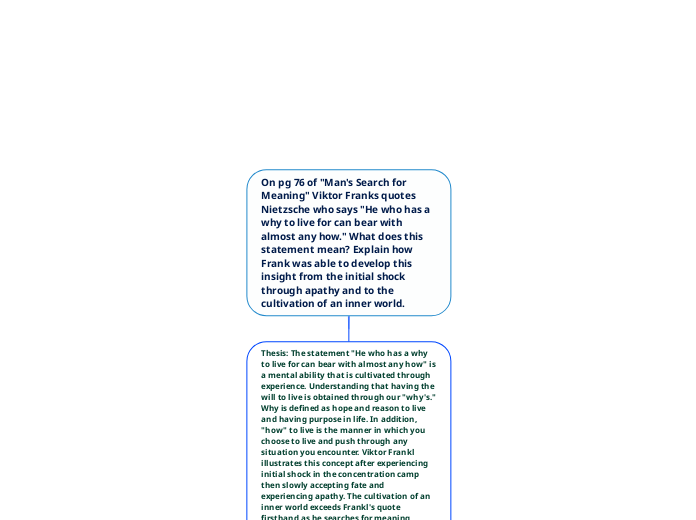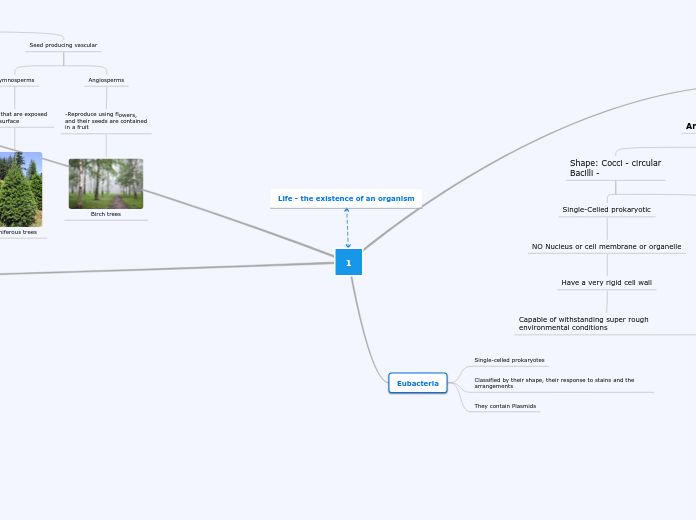On pg 76 of "Man's Search for Meaning" Viktor Franks quotes Nietzsche who says "He who has a why to live for can bear with almost any how." What does this statement mean? Explain how Frank was able to develop this insight from the initial shock through apathy and to the cultivation of an inner world.
Thesis: The statement "He who has a why to live for can bear with almost any how" is a mental ability that is cultivated through experience. Understanding that having the will to live is obtained through our "why's." Why is defined as hope and reason to live and having purpose in life. In addition, "how" to live is the manner in which you choose to live and push through any situation you encounter. Viktor Frankl illustrates this concept after experiencing initial shock in the concentration camp then slowly accepting fate and experiencing apathy. The cultivation of an inner world exceeds Frankl's quote firsthand as he searches for meaning through self-control and resilience to find purpose in life.
MAIN POINT: The prisoners cultivated their "why's" through an inner world in order to bear their "how's" and adapt to their environment.
The mental escapism for the prisoners started when they would dream at night. They found that it was their only time everyday where they could be in a reality where they weren't being tortured.
The prisoners perception of their lives were altered having an internal escape in order to survive, not be negatively affected longer
In their minds, the prisoners sought peace from the unrelenting horrors of the camps. They learned mental coping skills to deal with the psychological and physical abuse they suffered, as they could not give into the mental turmoil any longer. The needed to gain self-control or they would be in a complete loss of themselves. To temporarily escape the harsh realities of the camp, some resorted to reminiscing happy, romantic, or self-accomplished events from their previous life. even though everything was taken from them, the prisoners were able to hold onto their internal enjoyment in which that could not be taken away from them
The prisoners mutually started their imagination through food. Given the horribly conditioned foods, they found psychological and emotional pleasure in dreaming and discussing desirable foods to be a little happy
The prisoners developed mental havens by using their imaginations and creative abilities. They attempted to maintain a sense of their inner lives and intellectual abilities by engaging in thoughts or inner imagery, such as mentally creating music, recalling hobbies and loved ones, or having philosophical conversations.
Some prisoners would hold on to their political and religious beliefs in order to have faith in themselves and survival to stay hopeful
The prisoners had an appreciation and remembrance about their wives which hit a sensitive spot towards them. This triggered them into grounding themselves into realizing their loved ones and how much care they have for them that maybe they will be their motivation to stay alive. This was the start of their inner world. There was a small sense of humanity within them and knowledge of purpose with their hope that their wives are doing better than they are
Frankl understood that holding onto love will make any situation a little more hopeful and purposeful because they have someone to live for.
Allowing himself to get lost in his inner world is how Frankl managed to stay sane and alive. He formed a mental cultivation which helped him have an outlet for himself to sort of escape his physical being. This portrays how having a why to live gives strengths amongst humans into having long-term hope and meaning
Creating this mental sanctuary helped the prisoners in many aspects of their lives. Their attitude towards each became stronger as they formed connections with one another and had a more stable emotional barrier. They bonded more with one another and there was potential for real human emotion. They also started to build up each other with courage and motivation to help them imagine what their lives would be like one day outside of the camp. encouraging them to have something to attach to, Frankl aided his fellow prisoners with a guarantee of a bright future in spite of their current situation. He motivated them to grab onto their beliefs and to view their past enjoyments and accomplishments as inspiration to shift their perspectives in a hopeful manner. Going off of that, they were able to stick up for each other and help each other in times of sickness and suffering. They also spread humor and music amongst one another which made them smile through the dark times and shared stories which gave them something to look forward to.
This mentality made his circumstance seem farther and have their own perception of their world
This intensification of inner life helped the prisoners fund refuge from the emptiness, desolation, and spiritual poverty of his existence, by letting him escape into the past and future. However having an inner freedom does not mean to HOLD ON to the past because that would make one less hopeful of the future and unappreciative of what there is to enjoy life in the present.
Shifting their focus to things they enjoyed like art, spirituality, food, and more brought them happiness is how the prisoners essentially survived because they had positivity in their mind. Without these goals and enjoyments, they would be stuck in a provisional aspect of their future where it seems unattainable.
Creating scenarios in beautiful settings with their beloved people created mental control and a break through gloomy times
This sign that Frankl's wife was always there with him in spirit gave him motivation and strive to be resilient. In addition, the world would seem less depressing, positive things would stand out even more now
Transforming their suffering into an inner world helped the prisoners emotional reactions because the small achievements that they would encounter would seem much bigger now and helped them stay hopeful.
Putting their trust in fate was healthier for the prisoners as it was a waste of energy because fate would take its own course and to not influence it in anyway. They began to see death as unavoidable but not scary and that the future is unknown. each prisoners fate was written for them so they may as well just go with the flow of life.
MAIN POINT: The admission phase of the camp caused initial shock amongst the prisoners but was overcome through the insight of apathy.
APATHY
At this point, the prisoners were engulfed with having no worth for their lives that they looked forward to the thought of death/suicide. It was common that some of the prisoners were jealous of some people who were put out of their misery
The prisoners who were not yet in the apathy stage still felt remorse towards themselves ad their fellow prisoners, They still carried some sort of care and attachment
They no longer had any feelings towards any connections they had with humans, they were emotionless and felt nothing at the sight of death
The psychological damages were so severe upon the prisoners that most of them were numb and stood almost lifeless after being beat. It seems slick they felt no physical pain and that the pain was coming from within. Though he still remembered the beatings in great detail, Frankl never forgot the mental separation from his physical body at that time. The physical torment was barely even recognized, more so the emotional pain was what was more damaging.
The mental withdrawal was so great that a lot of the times Frankl was more so observing unnecessary details about his surrounding during traumatic moments that an average human would have existing emotions.
A significant event took place where a fellow prisoner and friend of Frankl's that he had talked to in the morning was, later that day, having his corpse being dragged and Frankl had no reaction. This portrayed apathy at its finest due to his lack of interest and emotional attachment. Frankl was actually watching the lifeless body being dragged while casually eating soup, withdrawing himself from having a regard for others. He mentions that the only reason he even remembered this moment happening was because he noticed his emotional numbness towards a tragedy like this.
The prisoners' lack of long-term thinking and purpose is highlighted greatly when they would wake up every morning. Though they had a small chance during slumber ti escape from their horrible reality, waking up to the lives they had to live over and over again everyday was more depressing and the most diminishing realization for them. Any nightmare was worth having if they could have some type of escape because whatever nightmare the prisoners had, they all knew it was better than their reality.
They used apathy as a defense mechanism against the ongoing suffering, terror, and hopelessness that pervaded the camps. They tried to detach themselves from the constant pain all around them by becoming emotionally numb. They used this survival mindset as a self-preservation to protect themselves from more emotional torture. This decreased connection, hope, morals, attachment, worth, and care.
The prisoners will to survive was diminished by their extended exposure to harsh circumstances and ongoing fear for their life. They were apathetic and passive toward their situation as a result of their weakened sense of purpose and lack of motivation.
ADMISSION PHASE
Upon their arrival to Auschwitz, the prisoners did not fully come to terms with the admission until they saw it in front of their eyes. The dread did not prepare them for preparing themselves
There was silence when the prisoners first entered the camp as they could not grasp that what they were about to witness was real
The prisoners encountered older inmates and Capos, this illustrated an example of their potential future and if they could make it out alive
Many of the prisoners had not reached the shock phase yet considered they still questioned if EVERYTHING would be taken away from them
When the guards were taking their possessions, Frankl tried to reason them into letting him hold on to his manuscript that was important to him. This showed he did not fully understand what was going on
He soon realized that he had to accept his new life and that it was never going to be the same again, no point in denying it
He had to understand that his former life was dead and that he brought into a completely different one and that it was actually happening before his eyes
Being admitted also meant acceptance and that there was nothing he could do to change that
Understanding what was going on and then reaching acceptance was the culminating point of the shock phase and acknowledging the fact that everything he knew about himself and his former life does not exist anymore
According to Frankl, there was arange of feelings during the shock phase, such as great loss, disbelief, confusion, fear, and anger. Initially, many prisoners struggled to accept the harsh reality they were facing and held onto the belief that their experience would only last a short while.
Prisoners endured harsh circumstances during this initial stage, which destroyed their sense of normality. Prisoners experienced disbelief because to the abruptness and intensity of the camp experience, finding it difficult to accept the extreme cruelty and dehumanization they endured to.
Their freedom was totally taken away, their belongings were taken from them, and their identities were reduced to nothing more than numbers. Many prisoners experienced a numbing effect from this shock, which prevented them from processing the significance of their situation and left them in a state of psychological paralysis.
MAIN POINT: The conditions and dehumanization that the prisoners were faced with caused them to enter the first phase.
DEHUMANIZATION
The prisoners were beaten with leather straps whenever they "misbehaved" or were not working well by the SS men, They faced constant humiliation and verbal abuse from the guards as well
They were stripped of all their belongings so it was almost as if a part of their identities was taken from them. They were left with absolutely nothing
The prisoners were also addressed as numbers so even their names were nonexistent, each had a number tattooed and sewn to them as a way to take away their humanity. The SS men had no desire for morally accurate identifications for the prisoners, they were seen as animals
If any of the prisoners were sick or got sick, they would usually put them in the gas chambers
The prisoners were also had to fully shave every singe hair on their body which idolized the fact that to the SS men, they were all the same and nothing to them and to humiliate and shame them. Any personality that they had before (because hair is also an identification of one's self) was completely gone. Some looked at themselves as unrecognizable as their was no link to their former selves
There was a moment where Frankl was about to be punished for taking a break while working. However, the guard dehumanized him more than the actual beatings by stated that Frankl was not even worth punishing.
The prisoners acknowledge the audacity that the guards had to brutally insult every aspect of the prisoners as a human, which sometimes hurt more than the abuse, without giving a care in the world about who they were before the camp
CONDITIONS
Starvation was very common due to the insufficient and small rations of food, they were lucky if they even got food that day
They had to learn to divide their rations of bread and soup everyday in order to not starve throughout the day, the hunger became so big sometimes it was hard to resist to eat all their rations in one go to fill that hunger, but then later that day they knew they would regret it
Malnutrition was also frequent amongst the prisoners which one of many causes of deaths and decreasing inability to work due to physical weakness
Harsh weather conditions with no items to overcome to work, barely had a decent piece of clothing
The only clothing they had were the striped clothing that they were given and in horrible condition for the rest of the time they were in the camp
Their shoes were very significant because they were only given those in order to work and most of the time did not fit them or they would be ruined but would still be worn. Through frostbite, injuries, and swollen feet they still worked in those conditions
Their shelters accumulated all of the prisoners in one area that definitely was not meant to fit them all; overpopulation
They all slept on boards as beds that were about 8 feet wide and each had to fit 9 men. They had blankets but no pillows so they would have to use each other as pillows or even their torn up shoes as pillows
The lack of hygienic amenities and limited access to clean water caused diseases like dysentery and typhus to spread rapidly among the prisoners, worsening their already poor condition.
They were forced to operate in unreasonably lengthy workdays and frequently performed strenuous work without sufficient sleep or food. For many prisoners, this harsh abuse resulted in bodily harm, weariness, and an abrupt decline in health.
There was very little to no medical treatment available in the camps, and those who was sick or hurt got almost nonexistent care. The weak and ill were frequently ignored and left to suffer









